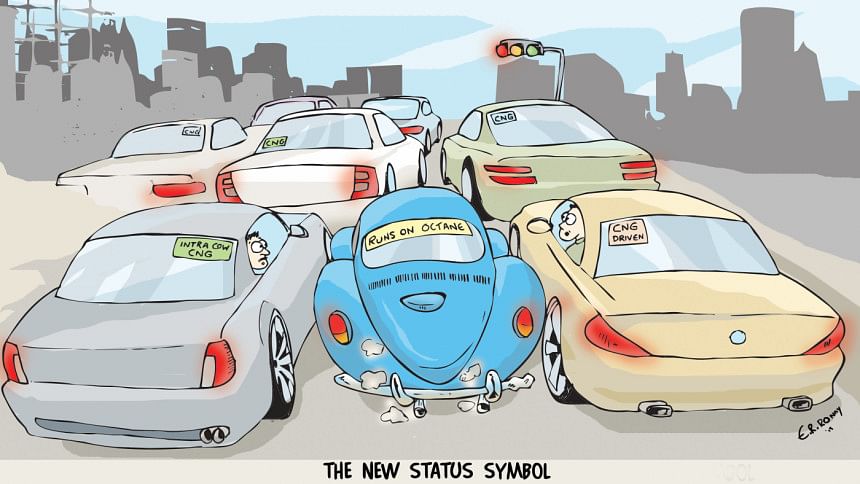The gods of glitter

During my late teens and early twenties I was obsessed with the dream of a free, secular and democratic Bangladesh. When boys and girls in other parts of the world were dancing to the tunes of Elvis Presley and the Beatles in the '70s, young people in Bangladesh were inspired by the nationalistic verses of Tagore and the revolutionary ideas of Nelson Mandela. It was the golden era of the country's history and I was fortunate to be a part of it because it helped define who I am today.
In many ways, a politically charged youth has been a blessing. But sometimes I wonder if it has left a gaping hole in my education -- and I don't mean academic education. I mean the kind that helps you cope with a society where most people are incessantly trying to establish their status in terms of money and class. In recent years the act of self-aggrandisement has been developed into an art form, where all kinds of subterfuges are used to convey one's superior social position. For instance, it's too brazen to say: "Come and appreciate my collection of rare paintings or antiques" or "I just acquired a Rolls Royce." People thus resort to name-dropping, talking about vacations at prestigious destinations and making references to their access to exclusive clubs and institutions.
In the past, status spoke for itself. Everyone knew who you were the moment you entered a room since people of a certain class exuded an aura and preferred to interact within their well-defined social group. I am glad that social norms have changed and today family does not automatically confer status -- especially in the western egalitarian world. Sadly, things have not changed for the better. The social pecking order is now primarily driven by material things like owning an expensive home, a flashy car or designer clothes and jewelry. But with the proliferation of fake designer stuff and the nouveau riche acquiring Jaguars and BMWs, luxury items are no longer considered to be a hallmark of elitism. Hence these status symbols are posing to be a problem for those trying to prove that they "belong." Human nature being what it is, the status-conscious crowd are inventing novel ways of asserting their special place in society. What better way of doing this than to inject important names, places and institutions in conversations? Thus even a casual discussion is deftly packaged with savvy references to exotic hotels, first class air travel and exclusive colleges the children have attended.
Once they have established their social niche through subtle references to their wealth and material possessions, the status seekers are eager to burnish their cultural credentials. This is quite understandable since they would not like to be known as "rich but with no class." They unabashedly show off their "knowledge" of the arts and literature by casually quoting (or misquoting) a few lines from Shakespeare or Tagore or mentioning how "Ravi Shankar introduced me to Raga Yaman when he was dining at my place." Please don't get me wrong. I am in no way suggesting that culture is the exclusive preserve of the virtuosos and art connoisseurs. I believe that everyone should have access to the arts and develop an appreciation for them. My point is that cultural taste is something you acquire over the years and should not be dependent on how many books you own or whether or not Rashid Khan visited your home.
The other unfortunate fall out of this elitist trend is that professional excellence has become a casualty to the practice of leveraging your status and impressing by talking big." In a highly competitive environment "contacts" serve as the defining element in clinching business deals. This explains the growing tendency to focus on networking and self-promotion rather than honing professional skills. Most readers will agree that potential employers are often inclined to hire people who impress them with their name and institution dropping rather than those who simply offer solid professional credentials.
The "status culture" has made a serious dent not only in our value system but has also impacted our daily lives. Recently, I was having lunch with some friends at a local restaurant. The service was excruciatingly slow and one of my friends was anxious to get back to work. She called the waiter and said: "When I was here last week with the minister for ----, the food appeared in 10 minutes. Today, we have been waiting for half an hour etc." Needless to say, the strategy worked. But it left me wondering -- what kind of a world do we live in that a minister's name has to be invoked to get a Masala Dosa served on time in a casual eating joint? Certainly not the kind of democratic world that I dreamed of, after Bangladesh's liberation in 1971!
The writer is a renowned Rabindra Sangeet exponent and a former employee of the World Bank.
E-mail: [email protected]

 For all latest news, follow The Daily Star's Google News channel.
For all latest news, follow The Daily Star's Google News channel. 



Comments